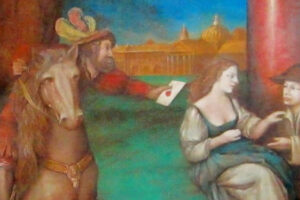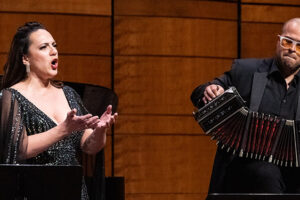
Our Own Gualtier Maldè reports:
The Met’s orchestra and audience have found a new conductor to love: Daniel Barenboim.  The debutante conductor got a huge ovation before he even lifted his baton. Lots of applause for Danny B. all night from an adoring audience including a generous amount at his final bow. There was lots of touchy feely with the orchestra during his travels to and from the pit. He conducted from a chair, like Levine does, sometimes leaning back against the wooden partition of the orchestra pit and laying his head on the railing as if to bask in Wagner’s orchestral beauties. At the end of the show the orchestra stayed in the pit and gave him a standing ovation while he blew kisses from the stage.
Other than Rene Pape (who as usual got the biggest ovation at the end of the evening), it was all Barenboim’s show. His control over the orchestra was wizardly – hairpin changes of orchestra levels and dynamics, perfectly lucid instrumental textures and x-ray delineation of detail. The Met Orchestra seemed under his hypnotic spell and played as well for him as they do for Levine, maybe better. However, the interpretation was rather clinical and stoic. The Prelude told much of the story – while each phrase was beautifully shaped the sense of frustration and longing in each of those unresolved but mounting phrases was missing.Â
There was a sense of detachment from human feeling and a philosophical remoteness that was more appropriate to the Grail music of Parsifal than the passionate, surging Tristan. It all sounded too smooth and often too loud for the soloists (many of whom were undervoiced for this opera in this house). On the other hand, several passages that sound dull or workmanlike in other hands, for example the “Tag” section of the Act II love duet, were revelatory under Barenboim who found beauty in every phrase. He created highlights out of sections that are often mere waystations to more beloved sections of the score. His Act III was his best achievement, giving musical pleasure and dramatic interest that the tenor couldn’t always provide.
Now to the leads – they were both weakest in Act I and improved throughout the night (in the tenor’s case it was not vocal quality but endurance without vocal breakdowns). Katarina Dalayman‘s voice might impress as a hochdramatische in a European house half the size of the Met. It is a strange voice sounding something like a lifted mezzo a la Martha Modl, but without the late diva’s interpretive intensity. The tone is dark and richer in the middle and bottom than Voigt‘s. The top is there and quite loud but she can get pitchy and unsteady in the upper middle break (disastrously in the final “Luft” in the “Liebestod”). However, the imposing, thrusting column of tone displayed by great Wagnerians like Helen Traubel and others is not there. She never, ever dominated the orchestra.  It is dark, it is musical but it seems on a smaller plane than everything around her.  Her rage in Act I went for little and Barenboim covered her in several places.
Hildegard Behrens and Gwyneth Jones made much less musical, even sounds but they had impact and really sold the character and the music with everything they had (and some things they no longer had or never had but they put it over).   Dalayman’s Act II showcased most of her more attractive qualities. She got through the big “Frau Minne” and extinguishing of the torch sequence with one of two good top tones making up for lack of tonal thrust below and made some adequate C’s for the entrance of “Tristan”. With the help of Barenboim’s magic baton she had plenty of lyric grace in the love duet. From there on, Isolde’s biggest challenges of vocal blast are behind her and I realized that Dalayman had paced herself very well and was going to finish the evening with her voice intact and capable of some tonal luster.
The “Liebestod”, resigned and less than monumental, confirmed my instincts. Dalayman to my knowledge has only previously done Isolde in concert versions of each act on different nights. Her dramatic interpretation was rather generalized. Voigt last year was actually a more interesting actress with more interpretive insight.  This may be Dalayman’s first run of the role complete in any house. Her interpretation is, as of now, not exactly searching or profound but she comports herself with dignity and got through it in one piece. But I was never overwhelmed or deeply moved by her.
Dalayman’s Tristan, Peter Seiffert has gotten beefier and more graceless both in his vocal endowment and his stage figure. The silvery, gleaming tone of the excellent Strauss and Mozart tenor he once was is still evident in his upper middle range when he collects the tone up there. Otherwise, it is a rather barky, grainy, blowzy sound in the middle that nevertheless managed to survive the endurance test of Act III intact. If I am going to have a lyrical Tristan, I actually found Robert Dean Smith of last year’s HD transmission more musically satisfying and tonally attractive and he has a better overall commend of the part. Christian Franz who subbed for the “Tristan Project” also was more impressive in the part. However, I am often more charitable to Tristans than I would be to a Lohengrin or Tamino due to the incredible and sadistic challenges that Wagner set for his tenor.
The earpiece feeding Seiffert his cues was only visible to me in Act III in his right ear. Many singers are very dependent on the prompter and this device really is just an electronic extension of the prompter. However, everything did seem rather external in his Act III delirium as if he were more focused on getting the words or notes out rather than being inside the situation. On the other hand, Seiffert did manage to get through the vocal marathon intact, his caterwauling finale to Act I and an ugly crack in a phrase in Act II gave me concern. His Tristan however, still seems like a work in progress and this is not Wagnerian bel canto.
Rene Pape rolled out a plush carpet of rich bass tone as King Marke without sacrificing verbal incisiveness. I love his interpretation which is regal and indignant – not a self-pitying old man but an upholder of chivalric honor – “How could his best knight and true friend so betray his honor and the code he had dedicated himself to uphold?”  Gerd Grochowski making his debut as Kurwenal is a slender, compactly built man with a rich baritone sound that tells in a big house. He has a sensitive, thoughtful face and is a responsive, intelligent actor. There was a little “bromance” going on in Act III to my biased eye, those caressing gestures and constant eye contact with Tristan telling a tale that Wagner didn’t dare address. Michelle de Young repeated her fine Brangaene from last season, often sounding more imposing than her mistress and making one wonder if she might make a soprano transition like Margaret Harshaw and others before her. The voice is brighter and more full at the top.
Barenboim seemed very happy with his debut and the Met was thrilled to have him.   However the search for a new generation of Wagnerians goes on. Voigt and Dalayman should stick to the jugendlich repertoire they have filled with distinction in the past. To my thinking, Violeta Urmana is the leading contender for the hochdramatische throne with Christine Brewer currently reigning there as well.  Both should be contracted for the upcoming Lepage “Ring” with Pape replacing Terfel as Wotan. But that will not happen alas. Meanwhile the Met should work to secure Barenboim’s return to a theater and an orchestra that has taken him to their hearts. — Gualtier Maldè























Comments